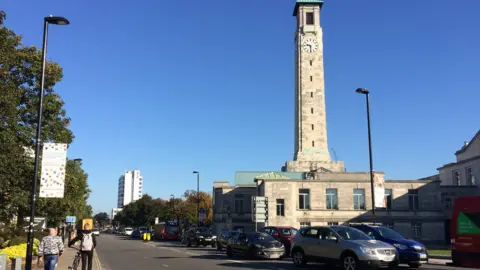Council U-turn over Southampton clean air charge
 BBC
BBCProposals to charge high polluting vehicles - including older lorries, buses and coaches - to drive in Southampton are set to be dropped.
The city council had suggested introducing a clean air zone to reduce nitrogen dioxide levels.
It says it can now meet EU limits for nitrogen dioxide by 2020 via a "refined set of freight, bus and taxi measures".
Clean air campaigners said the new measures would see the city "limbo dancing" just under the legal limit.
Almost 10,000 responses to a public consultation about implementing the clean air zone saw 56% agree with the plan.
The authority said a rise in the use of cleaner buses and a low emission taxi incentive scheme plus using cleaner fuels and equipment at the port "have all been successful in reducing nitrogen dioxide in the city".
'Nowhere near safe'
A bus that can filter pollution from the air is also being trialled in Southampton.
Campaign group Clean Air Southampton said under the council's latest proposals the city would be "nowhere near a safe limit".
Liz Batten, from the campaign group, said: "We question the reliability of the air quality modelling being used in this report, because the council's own measurements show that there are hot spots all over the city.
"The report says diesel cars contribute most nitrogen dioxide in Southampton - and yet there is no proposal to limit their use in the city."
The Conservative MP for Southampton Itchen, Royston Smith, said a charging scheme would have caused "untold damage to jobs and livelihoods".
"The law is clear. The city's air quality is to be brought into legal limits in the shortest time possible. A charging scheme would not have achieved that," he added.
New Forest council chiefs have also ruled out a charge for vehicles to tackle poor air quality on the edge of Southampton.
In May, the city was named by the World Health Organization as being at the limit for levels of fine particle pollution.
The plans will be discussed at a meeting on January 16. The city council is due to submit its business case to the government at the end of January.
Southampton is one of five English cities preparing to introduce clean air zones by 2020.
